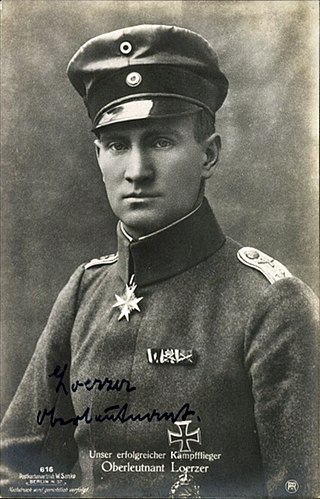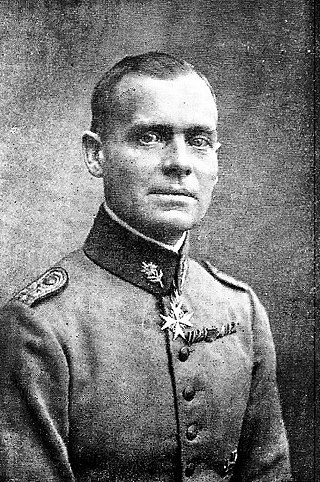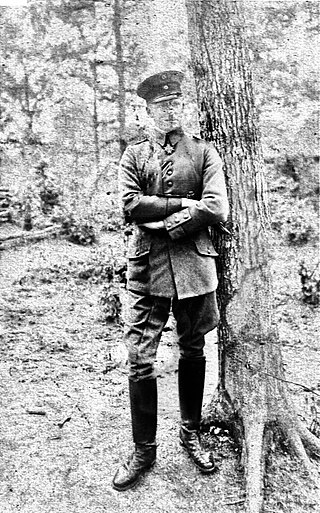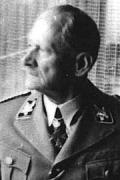
The Ruhr Red Army was an army of between 50,000 and 80,000 left-wing workers who conducted what was known as the Ruhr Uprising (Ruhraufstand), in the Weimar Republic. It was the largest armed workers' uprising in the nation's history, and ran from 13 March to 2 April, 1920, in Germany's most important industrial area. The workers were reacting to the Kapp Putsch, an effort by right-wing forces in March 1920 to overthrow the elected government.

The Pour le Mérite, also informally known as the "Blue Max", is an order of merit established in 1740 by King Frederick II of Prussia. The Pour le Mérite was awarded as both a military and civil honour and ranked, along with the Order of the Black Eagle, the Order of the Red Eagle and the House Order of Hohenzollern, among the highest orders of merit in the Kingdom of Prussia. The order of merit was the highest royal Prussian order of bravery for officers of all ranks.

Oskar Emil von Hutier was a German general during the First World War. He served in the German Army from 1875 to 1919, including war service.
Paramilitary groups were formed throughout the Weimar Republic in the wake of Imperial Germany's defeat in World War I and the ensuing German Revolution. Some were created by political parties to help in recruiting, discipline and in preparation for seizing power. Some were created before World War I. Others were formed by individuals after the war and were called "Freikorps". The party affiliated groups and others were all outside government control, but the Freikorps units were under government control, supply and pay.

Fritz Theodor Carl von Below was a Prussian general in the German Army during the First World War. He commanded troops during the Battle of the Somme, the Second Battle of the Aisne, and the German spring offensive in 1918.

The Marinebrigade Ehrhardt, also known as the Ehrhardt Brigade, was a Freikorps unit of the early Weimar Republic. It was formed on 17 February 1919 as the Second Marine Brigade from members of the former Imperial German Navy under the leadership of Hermann Ehrhardt. The brigade was used primarily in the suppression of the Bavarian Soviet Republic and the First Silesian Uprising, both in the first half of 1919. In March 1920, faced with its imminent disbanding by orders of the government in Berlin, the Marine Brigade was one of the main supporters of the Kapp Putsch that tried to overthrow the Weimar Republic. After the putsch failed and the brigade was disbanded in May, many of the former members formed the secret Organisation Consul under Ehrhardt's leadership. Before it was banned in 1922, it carried out numerous assassinations and murders in a continuation of the attempts to overthrow the Republic.

Oskar Gustav Rudolf Berthold was a German flying ace of World War I. Between 1916 and 1918, he shot down 44 enemy planes—16 of them while flying one-handed.

Bruno Loerzer was a German air force officer during World War I and World War II. Credited with 44 aerial victories during World War I, he was one of Germany's leading flying aces, as well as commander of one of the first Imperial German Air Service Jagdeschwaders.

Walther Karl Friedrich Ernst Emil Freiherr von Lüttwitz was a German general who fought in World War I. Lüttwitz is best known for being the driving force behind the Kapp–Lüttwitz Putsch of 1920 which attempted to replace the democratic government of the Weimar Republic with a military dictatorship.

Smilo Walther Hinko Oskar Constantin Wilhelm Freiherr von Lüttwitz was a German general during World War II and son of Walther von Lüttwitz. After World War II he joined the Bundeswehr on 1 June 1957 and retired on 31 December 1960.

Heinrich Kirchheim was a German generalleutnant who served in both World War I and World War II. He is also one of few German officers who were awarded the Pour le Mérite and the Knight's Cross of the Iron Cross. He also served as a deputy member on the "Court of Military Honour," a drumhead court-martial that expelled many of the officers involved in the 20 July Plot from the Army before handing them over to the People's Court.
Oskar Freiherr von Boenigk was a German Generalmajor, he began his military career during World War I as a fighter ace credited with 26 victories. He survived the war, served in the post-war revolution, and eventually rose to the rank of Generalmajor in the Luftwaffe during World War II.

The Ruhr uprising or March uprising (Märzaufstand) was a left-wing workers' revolt in the Ruhr region of Germany in March 1920. It initially took place in support of the call for a general strike issued by the Social Democrat members of the German government, the unions, and other parties in response to the right-wing Kapp Putsch of 13 March 1920.

Walther Gustav Reinhardt was a German officer who served as the last Prussian Minister of War and the first head of the army command within the newly created Ministry of the Reichswehr of the Weimar Republic. During the Kapp Putsch of 1920, Reinhardt remained loyal to the elected government and was one of the few senior officers of the Reichswehr willing to order troops to fire at the revolting units.
The Freikorps Lichtschlag was a paramilitary unit in Germany that was established on 14 December 1918 just after the end of World War I.

Gustav Adolf von Wulffen was a German highly decorated officer in the Wehrmacht with the rank of Generalmajor and SS-Officer with the rank of SS-Brigadeführer. He was decorated with the highest prussian decoration for bravery, Pour le Mérite on April 21, 1918, as Battalion Commander.

Hermann Josef von Kuhl was a Prussian military officer, member of the German General Staff, and a Generalleutnant during World War I. One of the most competent commanders in the German Army, he retired in 1919 to write a number of critically acclaimed essays on the war. Hermann von Kuhl is one of only three recipients to be distinguished with both the "military class" and "peace class" of the Pour le Mérite, Prussia's and Germany's highest honor.

Karl Ernst Manfred Freiherr von Richthofen was a German General der Kavallerie during World War I and recipient of the order Pour le Mérite, known informally as the Blue Max. Richthofen was a great uncle of his more famous namesake Manfred von Richthofen, known as the Red Baron, who was his godson and named after him.

Kurt Rackow was a German military officer and Pour le Mérite recipient who served in the Imperial German Army, Freikorps, and Reichswehr during World War I and the German Revolution of 1918–19. Rackow's most famous action was leading the capture of Fort Vaux during the Battle of Verdun.

Oskar Schwerk was a German Generalmajor and SS-Obergruppenfuhrer.
















